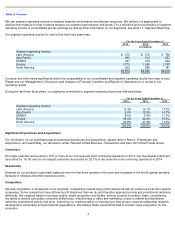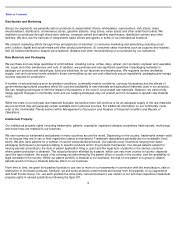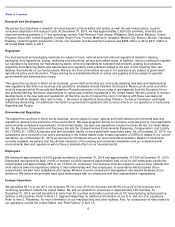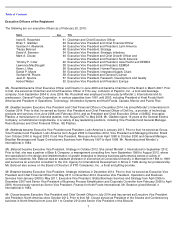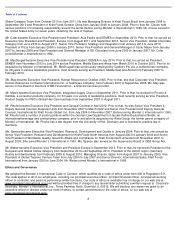Mondelez 2014 Annual Report Download - page 17
Download and view the complete annual report
Please find page 17 of the 2014 Mondelez annual report below. You can navigate through the pages in the report by either clicking on the pages listed below, or by using the keyword search tool below to find specific information within the annual report.
Table of Contents
With respect to acquisitions and joint ventures in particular, we are also exposed to potential risks based on our ability to conform
standards, controls, policies and procedures, and business cultures; consolidate and streamline operations and infrastructures;
identify and eliminate redundant and underperforming operations and assets; manage inefficiencies associated with the integration
of operations; and coordinate antitrust and competition laws in the United States, the European Union and other jurisdictions. Joint
ventures and strategic alliances pose additional risks, as we share ownership and management responsibilities with one or more
other parties who may not have the same objectives, priorities, strategies or resources as we do. In May 2014, we entered into an
agreement to combine our wholly owned coffee portfolio (outside of France) with D.E Master Blenders 1753 B.V., and in
conjunction with that transaction, Acorn Holdings B.V., owner of D.E Master Blenders 1753 B.V., made a binding offer to receive
our coffee business in France. We might not effectively separate our coffee business, integrate our operations into the new venture
or complete the transaction on the anticipated timeframe. Furthermore, we may not be able to complete, on terms favorable to us,
desired or proposed divestitures of businesses that do not meet our strategic objectives or our growth or profitability targets. Our
divestiture activities, or related activities such as reorganizations, restructuring programs and transformation initiatives, may require
us to recognize impairment charges or to take action to reduce costs that remain after a divestiture is completed. Gains or losses
on the sales of, or lost operating income from, those businesses may also affect our profitability.
Any of these risks and challenges could materially and adversely affect our business, product sales, financial condition and results
of operations.
We must correctly predict, identify and interpret changes in consumer preferences and demand and offer new products to
meet those changes.
Consumer preferences for food and snacking products change continually. Our success depends on our ability to predict, identify
and interpret the tastes, dietary habits, packaging and other preferences of consumers around the world and to offer products that
appeal to these preferences. Moreover, weak economic conditions, recession, equity market volatility or other factors could affect
consumer preferences and demand. If we do not offer products that appeal to consumers or if we misjudge consumer demand for
our products, our sales and market share will decrease and our profitability could suffer.
We must distinguish among short-term fads, mid-term trends and long-term changes in consumer preferences. If we do not
accurately predict which shifts in consumer preferences will be long-term, or if we fail to introduce new and improved products to
satisfy those preferences, our sales could decline. In addition, because of our varied consumer base, including by geography, we
must offer an array of products that satisfy the broad spectrum of consumer preferences. If we fail to expand our product offerings
successfully across product categories, or if we do not rapidly develop products in faster growing and more profitable categories,
demand for our products could decrease and our profitability could suffer.
Prolonged negative perceptions concerning the health implications of certain food products could influence consumer preferences
and acceptance of some of our products and marketing programs. For example, recently, consumers have increasingly focused on
health and wellness, including weight management and reducing sodium and added sugar consumption. In addition, consumer
preferences differ by region, and we must monitor and adjust our use of ingredients to respond to these regional preferences. We
might be unsuccessful in our efforts to effectively respond to changing consumer preferences and social expectations. Continued
negative perceptions and failure to satisfy consumer preferences could materially and adversely affect our reputation, product
sales, financial condition and results of operations.
Failure to maintain effective internal control over financial reporting could adversely affect us, and we have not
maintained effective internal controls over our accounting for income taxes.
The accuracy of our financial reporting depends on the effectiveness of our internal control over financial reporting. Internal control
over financial reporting can provide only reasonable assurance with respect to the preparation and fair presentation of financial
statements and may not prevent or detect misstatements because of its inherent limitations. These limitations include, among
others, the possibility of human error, inadequacy or circumvention of controls and fraud. If we do not maintain effective internal
control over financial reporting or design and implement controls sufficient to provide reasonable assurance with respect to the
preparation and fair presentation of our financial statements, we could be unable to file accurate financial reports on a timely basis.
As a result, our reputation, results of operations and stock price could be materially adversely affected.
14


